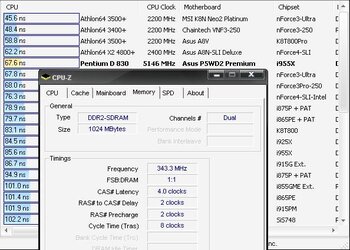- Joined
- May 2, 2005
- Location
- Seattle, WA
SiSoftware Sandra
Benchmark Results
RAM Bandwidth Int Buff'd iSSE2 : 7112 MB/s
RAM Bandwidth Float Buff'd iSSE2 : 7014 MB/s
Results Interpretation : Higher index values are better.
Int Buff'd iSSE2 (Integer STREAM) Results Breakdown
Assignment : 7211MB/s
Scaling : 7175MB/s
Addition : 7044MB/s
Triad : 7020MB/s
Data Item Size : 16 byte(s)
Buffering Used : Yes
Offset Displacement Used : Yes
Bandwidth Efficiency : 81% (estimated)
Float Buff'd iSSE2 (Float STREAM) Results Breakdown
Assignment : 7162MB/s
Scaling : 7174MB/s
Addition : 6898MB/s
Triad : 6823MB/s
Data Item Size : 16 byte(s)
Buffering Used : Yes
Offset Displacement Used : Yes
Bandwidth Efficiency : 80% (estimated)
Performance Test Status
Run ID : NICHOLAS-94BE82 on Friday, October 21, 2005 at 8:27:49 PM
Memory Used by Test : 512MB
NUMA Support : No
SMP Test : No
Total Test Threads : 1
Multi-Core Test : No
SMT Test : No
Dynamic MP/MT Load Balance : No
Processor Affinity : P0C0T0
Page Size : 4kB
Use Large Memory Pages : No
Chipset 1
Model : Advanced Micro Devices (AMD) Athlon 64 / Opteron HyperTransport Technology Configuration
Front Side Bus Speed : 2x 1100MHz (2200MHz data rate)
In/Out Width : 16-bit / 16-bit
Maximum Bus Bandwidth : 8800MB/s (estimated)
Logical/Chipset 1 Memory Banks
Bank 2 : 512MB DDR-SDRAM 2.5-4-4-8 2CMD
Bank 3 : 512MB DDR-SDRAM 2.5-4-4-8 2CMD
Channels : 1
Bank Interleave : 2-way
Speed : 2x 275MHz (550MHz data rate)
Width : 128-bit
Maximum Memory Bus Bandwidth : 8800MB/s (estimated)
Features
(W)MMX Technology : Yes
SSE Technology : Yes
SSE2 Technology : Yes
SSE3 Technology : No
EMMX - Extended MMX Technology : Yes
HTT - Hyper-Threading Technology : No
Performance Tips
Notice 5008 : To change benchmarks, click Options.
Notice 5004 : Synthetic benchmark. May not tally with 'real-life' performance.
Notice 5006 : Only compare the results with ones obtained using the same version!
Tip 2 : Double-click tip or press Enter while a tip is selected for more information about the tip.
I've never bothered testing the memory above 275x2 2.5-4-4-8 although I'm sure it's capable. It's G.Skill PC4400, and DDR1, for shame.
btw it's on crack about 2t command rate and single channel.... everything is set up correctly in BIOS.. dunno why it says single channel ..
Benchmark Results
RAM Bandwidth Int Buff'd iSSE2 : 7112 MB/s
RAM Bandwidth Float Buff'd iSSE2 : 7014 MB/s
Results Interpretation : Higher index values are better.
Int Buff'd iSSE2 (Integer STREAM) Results Breakdown
Assignment : 7211MB/s
Scaling : 7175MB/s
Addition : 7044MB/s
Triad : 7020MB/s
Data Item Size : 16 byte(s)
Buffering Used : Yes
Offset Displacement Used : Yes
Bandwidth Efficiency : 81% (estimated)
Float Buff'd iSSE2 (Float STREAM) Results Breakdown
Assignment : 7162MB/s
Scaling : 7174MB/s
Addition : 6898MB/s
Triad : 6823MB/s
Data Item Size : 16 byte(s)
Buffering Used : Yes
Offset Displacement Used : Yes
Bandwidth Efficiency : 80% (estimated)
Performance Test Status
Run ID : NICHOLAS-94BE82 on Friday, October 21, 2005 at 8:27:49 PM
Memory Used by Test : 512MB
NUMA Support : No
SMP Test : No
Total Test Threads : 1
Multi-Core Test : No
SMT Test : No
Dynamic MP/MT Load Balance : No
Processor Affinity : P0C0T0
Page Size : 4kB
Use Large Memory Pages : No
Chipset 1
Model : Advanced Micro Devices (AMD) Athlon 64 / Opteron HyperTransport Technology Configuration
Front Side Bus Speed : 2x 1100MHz (2200MHz data rate)
In/Out Width : 16-bit / 16-bit
Maximum Bus Bandwidth : 8800MB/s (estimated)
Logical/Chipset 1 Memory Banks
Bank 2 : 512MB DDR-SDRAM 2.5-4-4-8 2CMD
Bank 3 : 512MB DDR-SDRAM 2.5-4-4-8 2CMD
Channels : 1
Bank Interleave : 2-way
Speed : 2x 275MHz (550MHz data rate)
Width : 128-bit
Maximum Memory Bus Bandwidth : 8800MB/s (estimated)
Features
(W)MMX Technology : Yes
SSE Technology : Yes
SSE2 Technology : Yes
SSE3 Technology : No
EMMX - Extended MMX Technology : Yes
HTT - Hyper-Threading Technology : No
Performance Tips
Notice 5008 : To change benchmarks, click Options.
Notice 5004 : Synthetic benchmark. May not tally with 'real-life' performance.
Notice 5006 : Only compare the results with ones obtained using the same version!
Tip 2 : Double-click tip or press Enter while a tip is selected for more information about the tip.
I've never bothered testing the memory above 275x2 2.5-4-4-8 although I'm sure it's capable. It's G.Skill PC4400, and DDR1, for shame.
btw it's on crack about 2t command rate and single channel.... everything is set up correctly in BIOS.. dunno why it says single channel ..

